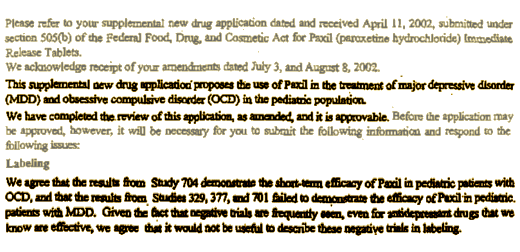-
an FDA letter to GSK from 2003 approving Paxil for use in children and adolescents.

-
Study 329 "failed to demonstrate the efficacy of Paxil in pediatric patients with MDD"
-
And they were in agreement that there wasn’t any need to put that on the package label?
by Dr. David HealyNovember 14, 2013…Study 329 began to unravel because a journalist, Shelley Jofre, working for BBC’s Panorama, accidentally left to her own devices, begin to dig. She went to the American Psychiatric Association Meeting in Philadelphia in May 2002, clutching the Keller-Laden paper. She was interested to interview some of the “authors”. One of her questions was “What is emotional lability?” There was a surprising number of children in 329 who became emotionally labile – what’s this? she asked. No-one seemed to know.
At APA, she approached one of the 329 authors Neal Ryan, who gave a non-answer and quickly got in touch with GSK to let them know a journalist was asking questions. A few weeks later in July and again in August, GSK send a dossier to FDA seeking approval for Paxil for children. A few weeks after that, on October 7th, to coincide with World Mental Health day [October 10th], Newsweek hit the streets featuring a depressed teenager on the front cover and a strapline Teen Depression: 3 million kids suffer from it. What you can do. The message inside was that Prozac was already being marketing for children and Paxil and Zoloft were about to be. What you can do – is get children on Prozac, Paxil and Zoloft.
Celebrating World Mental Health DayThree days later, on October 10th, World Mental Health Day, and the 40th anniversary of the passage of the 1962 amendments to the Food and Drugs Act, FDA sent GSK a letter saying Paxil was approvable for kids. Among other things, the letter notes that GSK had already told FDA that Study 329 showed that Paxil doesn’t work for depressed children. FDA were happy to go along with GSK’s suggestion that this should not be mentioned in the labeling of the drug. Given that the Study 329 publication majored on how effective Paxil was, it would have been inconvenient if the label said otherwise. There are many notable things in this approvable letter. Perhaps the most interesting is FDA asking GSK to clarify just what emotional lability meant.
FDA have later spun this into a story that their reviewers detected there was an increase of emotional lability events in Study 329 that needed looking at. In fact this idea came on their radar after conversations between Jofre and third parties led to a visit to FDA on August 28th and a suggestion to FDA that they explore the issue of emotional lability. FDA at the time had a few weeks to respond to GSK’s request to market Paxil for children. Neither Jofre nor the third parties knew at the time that GSK were seeking pediatric approval for Paxil…

FDA have later spun this into a story that their reviewers detected there was an increase of emotional lability events in Study 329 that needed looking at. In fact this idea came on their radar after conversations between Jofre and third parties led to a visit to FDA on August 28th and a suggestion to FDA that they explore the issue of emotional lability.
I want to convey absolute total outrage too. How can I express this productively? Who should I write to? How should I act and what should I do? I feel a little helpless now because of my agnosia.
Shelley Jofre should get a Pulitzer.